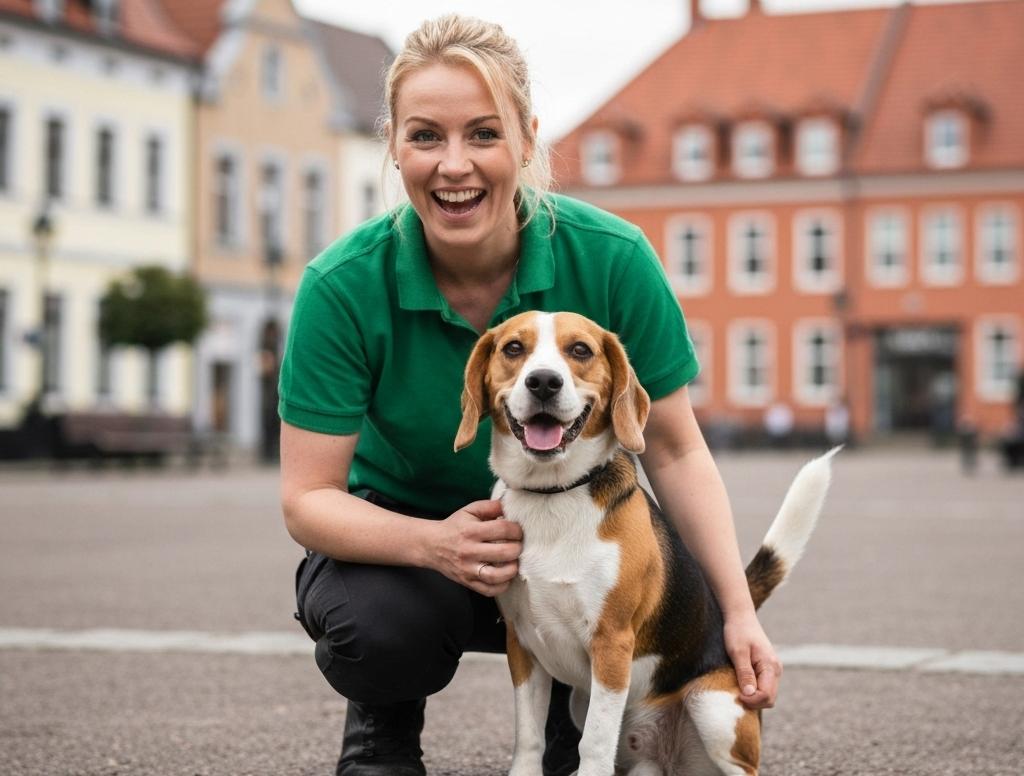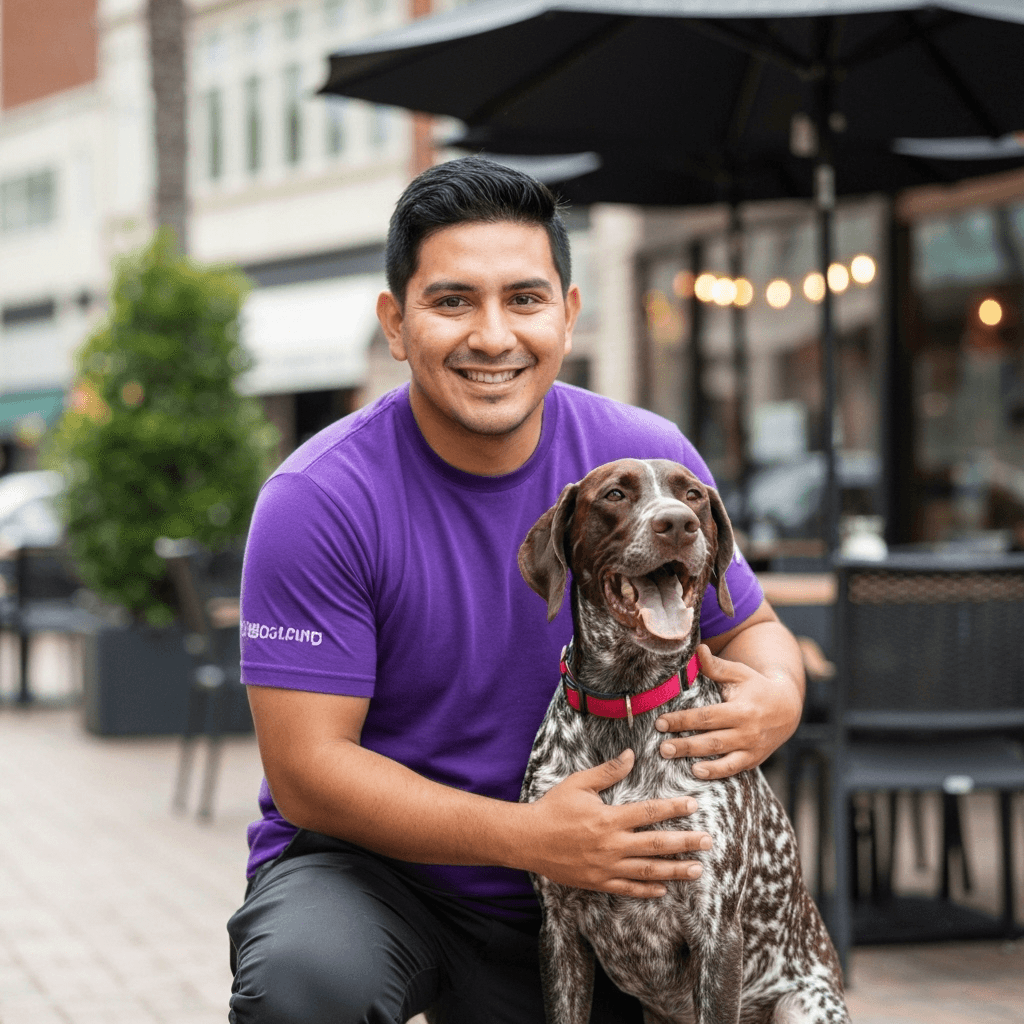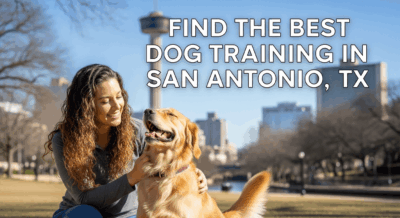Your Complete Guide to Choosing a Dog Trainer in San Antonio
Living in San Antonio with a dog means preparing for the real world around you. Your dog needs to handle crowds at the Pearl Farmers Market, navigate busy sidewalks in Southtown, and stay calm on patios along the River Walk. Whether you’re dealing with a puppy who pulls on walks or an older dog who barks at every delivery truck, the right training makes all the difference.
The challenge is finding a trainer who understands what San Antonio dogs actually face every day. You don’t need cookie-cutter commands that work in a quiet training facility but fall apart the moment you encounter a mariachi band or a group of tourists.
How to Choose the Right Trainer
The best trainers in San Antonio will ask about your specific situation before suggesting a plan. Do you live in a high-rise downtown where elevator manners matter? Are you in Stone Oak where your dog needs to handle joggers and cyclists? Does your dog need to be comfortable at dog-friendly restaurants in Alamo Heights?
Look for someone who uses positive reinforcement training instead of methods that rely on fear or intimidation. This approach teaches your dog that good things happen when they make smart choices, which is especially important in a busy city where your dog needs to stay focused around distractions.
Since Texas doesn’t require special licenses for dog trainers, you’ll need to do some homework. Ask about certifications like CPDT-KA or KPA-CTP, which show the trainer has studied animal behavior and learning theory. You can learn more about what these mean at dog trainer certifications.
Make sure your trainer carries liability insurance and can provide proof. If they’re working in public spaces or apartment common areas, they should understand local rules about commercial activities and secure any needed permits.
Common Dog Training Methods Explained

Different training approaches work better for different goals, and understanding your options helps you make the right choice for your dog.
Positive reinforcement training rewards behaviors you want to see more often. When your dog sits politely instead of jumping on visitors, they get a treat or praise. This method works especially well in San Antonio because it keeps dogs happy and focused even when there’s a lot going on around them.
Behavior modification takes a more targeted approach to specific problems like leash reactivity or fear of strangers. Your trainer will gradually expose your dog to whatever triggers them while keeping them under their stress threshold. It takes patience, but it’s the most humane way to help fearful or reactive dogs.
Puppy training focuses on socialization during those critical early months. San Antonio puppies need to experience everything from skateboards to street musicians while they’re still young enough to take new experiences in stride.
Basic obedience covers the everyday skills every city dog needs: walking nicely on a leash, coming when called, staying put when asked. These aren’t just party tricks – they’re safety skills that could save your dog’s life on busy San Antonio streets.
You’ll also need to decide between private lessons and group classes. Private training lets you work on your specific challenges at your own pace. Group classes cost less and give your dog practice focusing around other dogs, but they might not address your particular issues.
Day training and board and train programs can jump-start your dog’s education, but remember that you’ll still need to learn how to maintain those new skills at home.
Average Cost of Dog Training in San Antonio (Updated for 2025)
Training costs in San Antonio vary based on the trainer’s experience, your dog’s specific needs, and where the sessions take place. Expect to pay more for behavior issues that require specialized knowledge or for sessions during peak weekend hours.
| Service Type | Typical Price Range | What Affects Price |
|---|---|---|
| Group dog training classes, 4 to 6 weeks | $150 to $300 | Class size, facility fees, specialty topics |
| Private lessons, 60 to 90 minutes | $90 to $180 per session | Trainer credentials, travel, behavior needs |
| Puppy classes or puppy packages | $300 to $600 total | Number of sessions, age limits, materials |
| Day training, 3 to 5 sessions per week | $400 to $900 per week | Trainer time working your dog plus owner coaching |
| Board and train, 2 to 4 weeks | $1,800 to $4,200 total | Length of stay, follow-up lessons, level of care |
| Behavior consult for reactivity or anxiety | $120 to $250 initial | Assessment depth, written plan, vet coordination |
Most trainers offer package deals that bring down the per-session cost. If you need in-home training, expect travel fees of $10 to $30, especially if the trainer has to cross town during rush hour traffic.
San Antonio Rules That Affect Training
Understanding local laws keeps you out of trouble and helps your training go smoothly. San Antonio has some specific requirements that differ from other Texas cities.
The city requires all dogs to be leashed when off your property, except in designated off-leash areas in city parks. You can find current information at San Antonio Animal Care Services.
Instead of traditional dog licenses, San Antonio requires microchipping for permanent identification. Make sure your contact information stays current with your chip registry – it won’t help if your phone number is outdated.
Texas state law requires current rabies vaccination for all dogs. You can find details at Texas DSHS Rabies.
Excessive barking can get you in trouble with neighbors and the city, especially in dense areas like downtown apartments or townhome communities. Good training should include ways to keep your dog mentally satisfied so they’re not barking out of boredom.
If your trainer wants to use public parks for group classes, they may need permits from San Antonio Parks and Recreation. Responsible trainers handle this paperwork themselves and carry insurance for protection.
Questions to Ask a Potential Dog Trainer
When you’re interviewing trainers, these questions will help you find someone who’s a good fit for you and your dog:
- What training methods do you use, and how do you keep dogs comfortable and confident during lessons?
- What kinds of problems do you see most often with San Antonio dogs – leash pulling, reactivity to strangers, apartment living issues?
- What certifications do you hold, and how do you stay up to date on new training techniques?
- Can you show me what a typical training plan looks like for my dog’s specific issues?
- Where will we do our training sessions, and when will we practice around real distractions like crowds or traffic?
- What’s included in your price, and are there extra fees for travel or missed appointments?
- Do you carry liability insurance, and can you show me proof?
- How much practice will I need to do between sessions to keep my dog improving?
Local San Antonio Resources for Dog Owners
San Antonio offers plenty of places to practice your new training skills with your dog. McAllister Park Dog Park gives you a fenced area to work on recall without worrying about your dog running into traffic. Pearsall Dog Park has separate sections for small and large dogs if size differences make you nervous.
Phil Hardberger Park actually has two dog parks plus miles of walking trails where you can practice leash skills. Check out Phil Hardberger Park Conservancy for current hours and rules.
For a complete list of city dog parks with updated information, visit San Antonio Dog Parks.
The Howard W. Peak Greenway Trail System offers miles of paved paths where you can practice loose-leash walking without the distractions of busy streets. Find trail maps at Greenway Trails.
If you want to practice around crowds and historical sites, the San Antonio Missions allow leashed dogs. Check their pet policies at San Antonio Missions before you go.
For a day trip that includes water access, Guadalupe River State Park allows leashed dogs and offers different environments for training practice.

Common Questions
How much does in-home dog training cost?
Most in-home sessions in San Antonio run between $100 and $160 for a session lasting 60 to 90 minutes. You’ll pay extra travel fees if your trainer has to cross town, but many offer package deals that reduce the per-session cost.
Is in-home dog training worth it?
In-home training makes sense when you’re dealing with problems that happen at your house – door greeting, barking at windows, house training, or issues with stairs and elevators. Training where the problem actually occurs usually gets faster results than trying to transfer skills from a training facility.
Can you pay someone to house train your dog?
Yes, day training or board and train programs can help with house training, but you’ll still need to maintain a consistent schedule and routine at home. The trainer can teach your dog the basics, but house training success depends on your daily management.
What is the 3-3-3 rule for dog training?
This guideline helps set realistic expectations when bringing home a new dog. Plan for about 3 days for your dog to decompress from the stress of changing homes, 3 weeks to start learning your routines, and about 3 months to fully settle in and show their true personality.
How long will it take to reach my training goals?
Basic manners like loose-leash walking and reliable sit-stay typically take 4 to 8 weeks with daily practice. More complex issues like reactivity, separation anxiety, or fear-based behaviors can take several months of consistent work with a structured plan.
What should I bring to group classes?
Pack a regular collar or harness (not a choke or prong collar), a 6-foot leash, small high-value treats, water for your dog, waste bags, and vaccination records if the facility requires them. Leave retractable leashes at home – they make training harder.
What’s the leash law in San Antonio?
Dogs must be on leash or otherwise restrained when off your property, except in designated off-leash areas within city parks. Check Animal Care Services for current regulations and park-specific rules.
Do I need a dog license in San Antonio or Bexar County?
San Antonio uses microchipping instead of traditional dog licenses. Make sure your dog is microchipped and your contact information is current with the chip registry. Unincorporated Bexar County doesn’t require licenses either, but microchips and ID tags are smart backup identification. For county information, see Bexar County Animal Control.
What shots does my dog need in Bexar County or Texas?
Texas law requires current rabies vaccination for all dogs. Your veterinarian will recommend other vaccines based on your dog’s lifestyle and local disease risks. You can review state requirements at Texas DSHS.
Are dog trainers required to be licensed in San Antonio or Bexar County or Texas?
There’s no occupational license required for dog trainers in Texas. Since anyone can call themselves a trainer, look for education, certifications like CPDT-KA or IAABC-CDBC, client references, written training plans, and liability insurance.
Where can I practice off-leash recall?
Stick to fenced areas like the dog parks at McAllister Park, Pearsall Park, or Phil Hardberger Park. These locations have double gates to prevent escapes and give you a safe space to practice recall around other dogs and people. Start during off-peak hours when there are fewer distractions.
Which dog parks allow training around San Antonio?
Most city dog parks welcome training as long as you’re respectful of other park users and follow posted rules. McAllister Park Dog Park, Pearsall Dog Park, and both Phil Hardberger Park locations work well for practice sessions. Keep training sessions short and positive so you don’t monopolize space or equipment.
What beaches or trails allow dogs for training?
San Antonio doesn’t have beaches, but plenty of trails welcome leashed dogs. The Howard W. Peak Greenway system offers paved paths through different neighborhoods, and the San Antonio Missions provide historical settings for socialization practice. For water access, Guadalupe River State Park makes a good day trip for dogs who need to practice around swimmers and river activities.
Do trainers need insurance in Texas?
Texas doesn’t require insurance for dog trainers, but responsible professionals carry general liability coverage to protect themselves and their clients. Many venues require proof of insurance before allowing trainers to use their facilities or common areas.
Good training takes time and consistency, but it’s worth the investment when you can confidently take your dog anywhere in San Antonio. Look for a trainer who uses humane methods, understands city dog challenges, and gives you a clear plan for reaching your goals. With the right help and regular practice, your dog can learn to handle everything from River Walk crowds to backyard barbecues with confidence and good manners.
